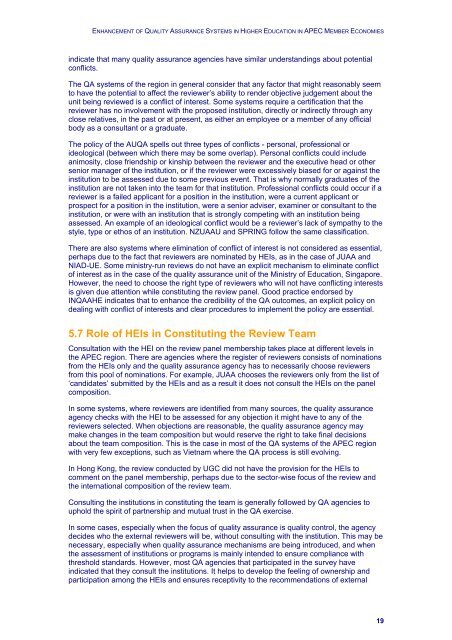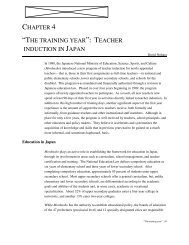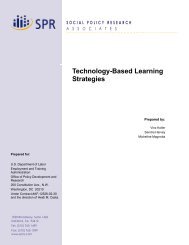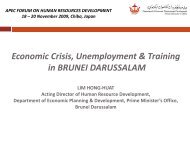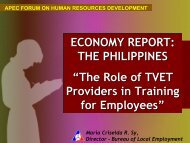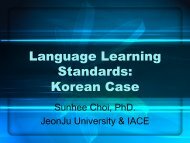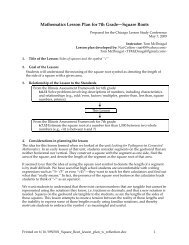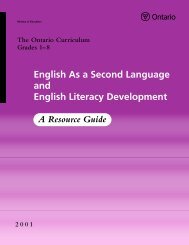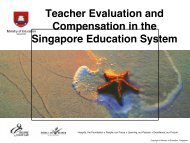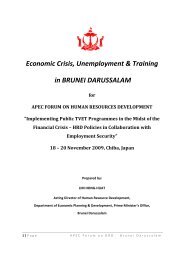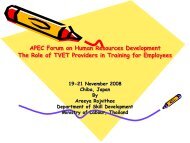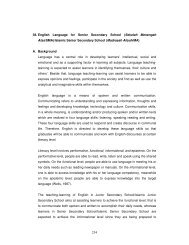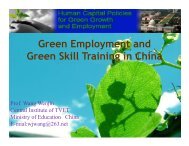Quality Assurance Systems in Asia-Pacific Economic Cooperation
Quality Assurance Systems in Asia-Pacific Economic Cooperation
Quality Assurance Systems in Asia-Pacific Economic Cooperation
You also want an ePaper? Increase the reach of your titles
YUMPU automatically turns print PDFs into web optimized ePapers that Google loves.
ENHANCEMENT OF QUALITY ASSURANCE SYSTEMS IN HIGHER EDUCATION IN APEC MEMBER ECONOMIES<br />
<strong>in</strong>dicate that many quality assurance agencies have similar understand<strong>in</strong>gs about potential<br />
conflicts.<br />
The QA systems of the region <strong>in</strong> general consider that any factor that might reasonably seem<br />
to have the potential to affect the reviewer’s ability to render objective judgement about the<br />
unit be<strong>in</strong>g reviewed is a conflict of <strong>in</strong>terest. Some systems require a certification that the<br />
reviewer has no <strong>in</strong>volvement with the proposed <strong>in</strong>stitution, directly or <strong>in</strong>directly through any<br />
close relatives, <strong>in</strong> the past or at present, as either an employee or a member of any official<br />
body as a consultant or a graduate.<br />
The policy of the AUQA spells out three types of conflicts - personal, professional or<br />
ideological (between which there may be some overlap). Personal conflicts could <strong>in</strong>clude<br />
animosity, close friendship or k<strong>in</strong>ship between the reviewer and the executive head or other<br />
senior manager of the <strong>in</strong>stitution, or if the reviewer were excessively biased for or aga<strong>in</strong>st the<br />
<strong>in</strong>stitution to be assessed due to some previous event. That is why normally graduates of the<br />
<strong>in</strong>stitution are not taken <strong>in</strong>to the team for that <strong>in</strong>stitution. Professional conflicts could occur if a<br />
reviewer is a failed applicant for a position <strong>in</strong> the <strong>in</strong>stitution, were a current applicant or<br />
prospect for a position <strong>in</strong> the <strong>in</strong>stitution, were a senior adviser, exam<strong>in</strong>er or consultant to the<br />
<strong>in</strong>stitution, or were with an <strong>in</strong>stitution that is strongly compet<strong>in</strong>g with an <strong>in</strong>stitution be<strong>in</strong>g<br />
assessed. An example of an ideological conflict would be a reviewer’s lack of sympathy to the<br />
style, type or ethos of an <strong>in</strong>stitution. NZUAAU and SPRING follow the same classification.<br />
There are also systems where elim<strong>in</strong>ation of conflict of <strong>in</strong>terest is not considered as essential,<br />
perhaps due to the fact that reviewers are nom<strong>in</strong>ated by HEIs, as <strong>in</strong> the case of JUAA and<br />
NIAD-UE. Some m<strong>in</strong>istry-run reviews do not have an explicit mechanism to elim<strong>in</strong>ate conflict<br />
of <strong>in</strong>terest as <strong>in</strong> the case of the quality assurance unit of the M<strong>in</strong>istry of Education, S<strong>in</strong>gapore.<br />
However, the need to choose the right type of reviewers who will not have conflict<strong>in</strong>g <strong>in</strong>terests<br />
is given due attention while constitut<strong>in</strong>g the review panel. Good practice endorsed by<br />
INQAAHE <strong>in</strong>dicates that to enhance the credibility of the QA outcomes, an explicit policy on<br />
deal<strong>in</strong>g with conflict of <strong>in</strong>terests and clear procedures to implement the policy are essential.<br />
5.7 Role of HEIs <strong>in</strong> Constitut<strong>in</strong>g the Review Team<br />
Consultation with the HEI on the review panel membership takes place at different levels <strong>in</strong><br />
the APEC region. There are agencies where the register of reviewers consists of nom<strong>in</strong>ations<br />
from the HEIs only and the quality assurance agency has to necessarily choose reviewers<br />
from this pool of nom<strong>in</strong>ations. For example, JUAA chooses the reviewers only from the list of<br />
‘candidates’ submitted by the HEIs and as a result it does not consult the HEIs on the panel<br />
composition.<br />
In some systems, where reviewers are identified from many sources, the quality assurance<br />
agency checks with the HEI to be assessed for any objection it might have to any of the<br />
reviewers selected. When objections are reasonable, the quality assurance agency may<br />
make changes <strong>in</strong> the team composition but would reserve the right to take f<strong>in</strong>al decisions<br />
about the team composition. This is the case <strong>in</strong> most of the QA systems of the APEC region<br />
with very few exceptions, such as Vietnam where the QA process is still evolv<strong>in</strong>g.<br />
In Hong Kong, the review conducted by UGC did not have the provision for the HEIs to<br />
comment on the panel membership, perhaps due to the sector-wise focus of the review and<br />
the <strong>in</strong>ternational composition of the review team.<br />
Consult<strong>in</strong>g the <strong>in</strong>stitutions <strong>in</strong> constitut<strong>in</strong>g the team is generally followed by QA agencies to<br />
uphold the spirit of partnership and mutual trust <strong>in</strong> the QA exercise.<br />
In some cases, especially when the focus of quality assurance is quality control, the agency<br />
decides who the external reviewers will be, without consult<strong>in</strong>g with the <strong>in</strong>stitution. This may be<br />
necessary, especially when quality assurance mechanisms are be<strong>in</strong>g <strong>in</strong>troduced, and when<br />
the assessment of <strong>in</strong>stitutions or programs is ma<strong>in</strong>ly <strong>in</strong>tended to ensure compliance with<br />
threshold standards. However, most QA agencies that participated <strong>in</strong> the survey have<br />
<strong>in</strong>dicated that they consult the <strong>in</strong>stitutions. It helps to develop the feel<strong>in</strong>g of ownership and<br />
participation among the HEIs and ensures receptivity to the recommendations of external<br />
19


